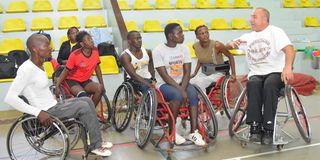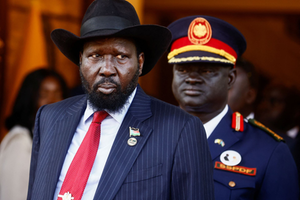Prime
Nabasirye played for rehabilitation, now she eyes a career in para-sport

Joan Nabasirye (in red jersey) with other trainees listening to Coach Dan Altan during the wheelchair sports clinic at Lugogo last week. PHOTOS | FRANK BAGUMA
What you need to know:
- In July 2017, Joan Nabasirye’s right leg was amputated. The physical wound healed pretty fast. But psychologically, she never stopped bleeding. After years of living in a shell, she has since gained confidence to turn her disability into a sporting ability.
One morning, Joan Nabasirye went to her workplace dressed in a pair of shorts revealing her amputated right leg. But when a senior colleague faulted her for showing her disability, she quit the job.
“I pretended like I would be away for treatment and never returned,” Nabasirye recently revealed.
“That lady did not know how much I had struggled with denial, trying so hard to hide my disability before I finally decided to come out.”
Nabasirye felt out of place.
“And since then I have never sought a job. I am striving to employ myself, because in Uganda it’s very hard to be employed when you have a disability.”
The 24-year-old with certificates in computer graphics and journalism, survives on making craft shoes, but strongly believes playing disability sports will open her better doors.
Fateful accident
In a minor boda-boda accident in 2011, Nabasirye knocked and injured her big toe. She took a tetanus shot at a nearby clinic.
Two months later, she wrote her Primary Leaving Examinations. But a year after the wound failed to heal, she went to Mulago National Referral Hospital, where she says she did not get serious treatment. In 2015, Mulago referred her to CoRSU Rehabilitation Hospital, in Kisubi, Entebbe Road, which conducted an operation that healed the wound. But when the wound reappeared after a short time, the doctors decided to cut off her biggest toe to save the other bones from getting infected.
Nabasirye faced more operations before she was diagnosed with chronic osteomyelitis—a dangerous bone infection. More interventions removed some bones from her right foot until 2017 when doctors suggested a below-the-knee amputation.
“At first, I rejected the idea. I had seen people with disabilities on the streets but it looked weird. I couldn’t imagine myself like them; without a leg.”
By then she did not need crutches to move. So, she thought, the surgery was unnecessary.
The amputation
But with persistent pain, Nabasirye eventually accepted the amputation. In July 2017, they cut off her right leg below the knee. The physical wound healed pretty fast. But psychologically, she never stopped bleeding.
“People came to check on me but I hated it. I just didn’t have the courage to face them,” she remembered the traumatic moments. I lost friends; I didn’t want to move out of the house; I didn’t want to meet people. I didn’t want them to know I was amputated. It really tortured me,” she said.
She had spent more time at home and in hospital than at school and at some point she gave up on studies. But after the amputation, in 2018, nearly seven years behind her former classmates, Nabasirye rejoined Senior One.
She chose a boarding school where she could hide from the public. Even there, she hid her artificial leg in long skirts. “In the dormitory, I waited for everyone to sleep before I removed my prosthetic leg.”
She waited for all to bathe, before she did. So, she was always the last to enter class.
“Fortunately, the teachers knew it and were lenient. But her secret did not last so long. “One girl woke up and saw my leg out of the blanket. All were shocked.”
Psychologically defeated, she dropped out after just two terms.
Becoming herself, again
“I only wore long dresses and skirts to hide my deformity, and any questions about my condition made me very uncomfortable,” Nabasirye remembers. “I didn’t let anyone with two legs to counsel me; I thought ‘what do you know about losing a limb?’”
She resorted to the internet.

Nabasirye and her colleague Sarah Nazziwa in a wheelchair basketball session in Lugogo.
“I searched for stories of PWDs, especially amputees. I found that some of the things they did were my dreams. Slowly, I started thinking I could rebuild my life and be like them.”
While studying computer graphics, she wore long dresses at the institute, but sported shorts elsewhere. “But when I sensed I was attracting unnecessary attention, I reverted to my long stuff.”
Being part of various WhatsApp groups of PWDs and meeting fellow amputees like Charlotte Mujuni helped her to accept her status and move on.
“But joining disability sports was the real deal. Socialising with people with even worse disabilities reduced my fears and I started seeing a future.”
In 2019 Nabasirye attended a para-badminton tournament at Lugogo Indoor Stadium. “I found PWDs playing without any concern about the conditions, which changed my mind and I wanted to join them.”
Soon, Nabasirye joined the wheelchair basketball team at the East African Zone V Championship in Nairobi in 2019.
The ladies team beat Tanzania 18-6 in-between two losses to hosts Kenya. But Nabasirye was already hooked.
“I wanted to play more.”
But soon, Covid came. And everything stopped for two years. But in early May 2023, Nabasirye joined the national team to the East African Zonal Qualifiers in Dar es Salaam, Tanzania. The ladies did not qualify for the inaugural 2023 African Paralympic Games, but the men’s triumph encouraged her that with a little more effort, they too can make it.
Gradually, she has peeled out of her shell. She even featured in the Hot Pink Show by Malengo Foundation, where people of different disabilities modeled on the runway.
And soon, the Jojo, who used to hide her leg, started flaunting it on Instagram, with inspirational messages or messages. Sometimes, she dances on her prosthetic leg. Sometimes, she pulls off several strokes, smiling and winking, just on one leg.
That’s when most of her social media followers began flooding her inbox: “You mean all along you are an amputee?” they wondered. This time her answer was a simple yes, no longer discomforting. “That’s when I prioritised talking about PWD lives.”
Potential
Last week, Nabasirye was among the 30 athletes who attended the wheelchair sports clinic conducted by University of Arizona coach Peter Hughes and his Canadian colleague Dan Altan, under Global Sports Mentoring Programme, an initiative of the US Department of State. At the four-day clinic inside the Lugogo Indoor Arena, Nabasirye learnt new skills and tactics.
“We have been used to gathering on the ball but the American coaches have emphasised that widening the field and throwing long balls gives us an advantage over the opponent,” she said.
“We have also improved on focusing, throwing and scoring accuracy.”
Coach Hughes, the co-founder of Wheelchair Athletes Worldwide, the charity that has donated wheelchairs to India, Nepal, Peru, Indonesia and Uganda, commended Nabasirye and her colleagues for team work.
“The women in particular tend to have more team work and increase their knowledge quite quickly,” he told Full Woman.
Meanwhile, Ali Mukasa Kibirango, the vice-captain of the men’s national wheelchair basketball team, calls Nabasirye a very talented player, with huge potential if she trains properly.
“In badminton, I have only seen her train, I need to see her in a competition to gauge her ability. But in wheelchair basketball and sitting volleyball she is really good and in the near future she will be a pillar in the women’s national teams,” Mukasa said.
“When we went to Kenya in 2019, she had just joined sports but she performed really well. And she has not disappointed because she also performed well in Dar es Salaam.

University of Arizona coach, Peter Hughes monitors Nabasirye’s progress on court.
“Joan is fast, dribbles well and her shooting is different from others. She and another girl from Gulu are really good. Her only challenge is transport money to attend training.”
During the training at Lugogo, Nabasirye wrapped her left ankle in white bandage. The bone infection that cost her right leg, also attacked her left leg, eating away some toes. Last October, she did a social media fundraiser to get Shs2m for another operation that had been delayed.
“I finally had the operation, but I cannot say I am completely out of harm’s way. Doctors say the infection can recur anytime.” But she will not stop playing.
Playing for purpose
Nabasirye plays para-badminton, table tennis, wheelchair basketball and sitting volleyball. She also tries wheelchair rugby though, by international standards, it is fitter for people with spinal defects like her friend Sarah Nazziwa.
But beyond boosting her self-esteem, physical wellbeing and overcoming stress and depression through sports, Nabasirye plays with bigger ambitions. “With adequate training and facilitation we can win international trophies.”
She also pursues sports as the road to a dream career. Soon, she could attend a table tennis workshop abroad, before travelling to Nigeria for classification.
“After being classified internationally, I will be able to play in any major tournament. That’s how I will get opportunities to explore my sports and academic credentials.
“It’s the career path I am chasing, because getting a job as a PWD, in Uganda, is not easy.”
Perhaps, that is what Coach Hughes echoed in his farewell speech: “I want these athletes to explore their abilities and show that beyond playing they can also get jobs and inspire others through sports.”
Disability a possibility
For years, Nabasirye, like many PWDs, has endured not only the physical pain but also trauma and stigma.
Remember that day she quit her job, because she was criticized for showing her amputated leg? Perhaps, she has learnt to live with it. Otherwise, how many can quit a job like she did? But she wants to change perceptions and attitudes to help others overcome stigma.
“I wish I could tell everyone in this country that PWDs deserve to be treated with respect and love, after all, disability is a possibility for everyone.”
She also prides in counseling others, especially amputees, battling the challenges that tortured her for years. She tells women with disabilities that whoever is dating you is not doing you a favour. “He’s just accepting you the way you are.”
She adds: “I feel peace if I help someone to believe again.”
Interestingly, she says, even those without disability confess to being inspired by her story.
Nabasirye started wearing short outfits to reveal her body not to gain sympathy. “I wanted to show people that PWDs, like anyone, can socialise and explore their fashion desires.”
Nabasirye spent her entire teens in shock. But gaining the confidence to turn her disability into a different ability is her biggest achievement, so far.




